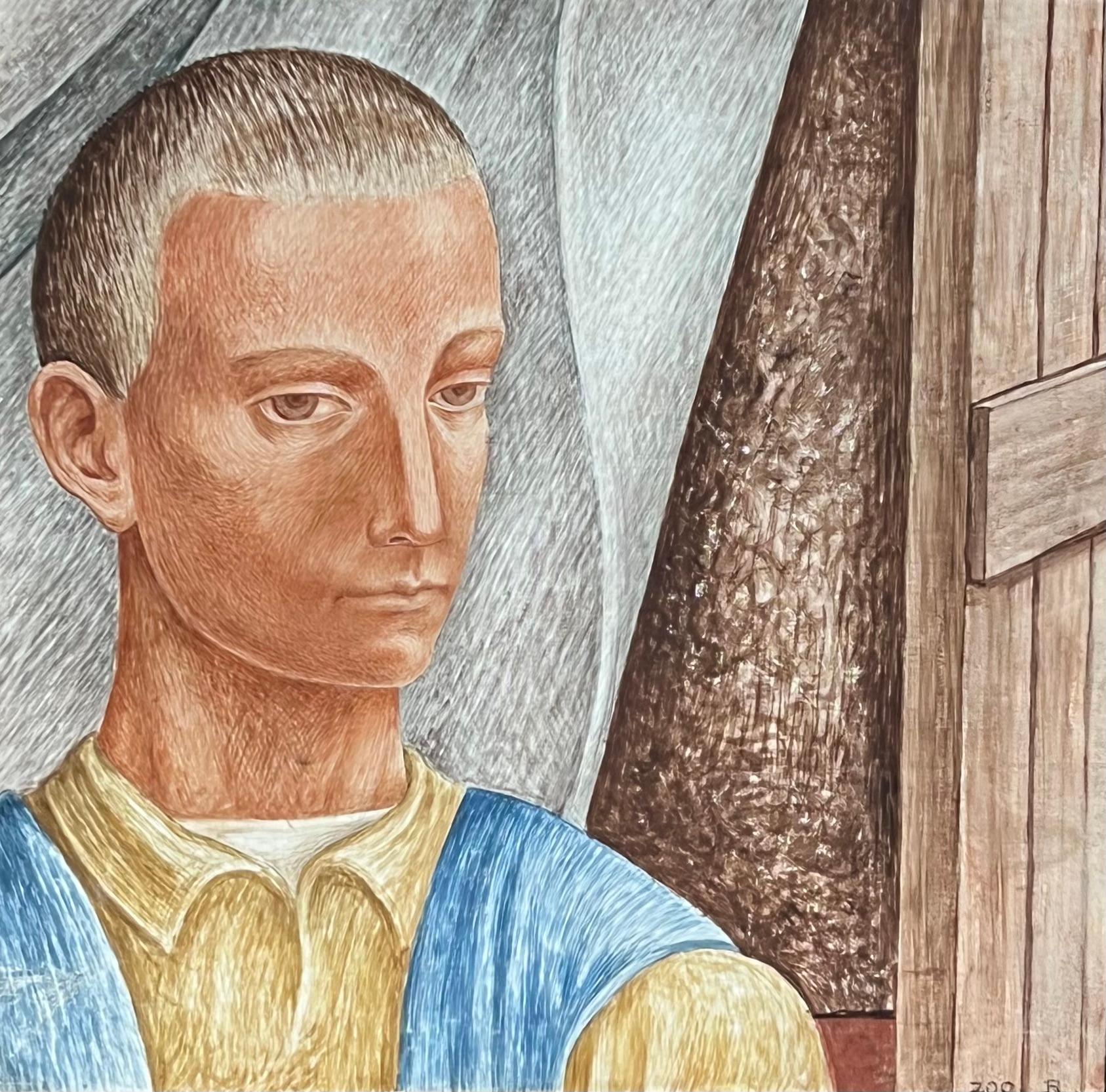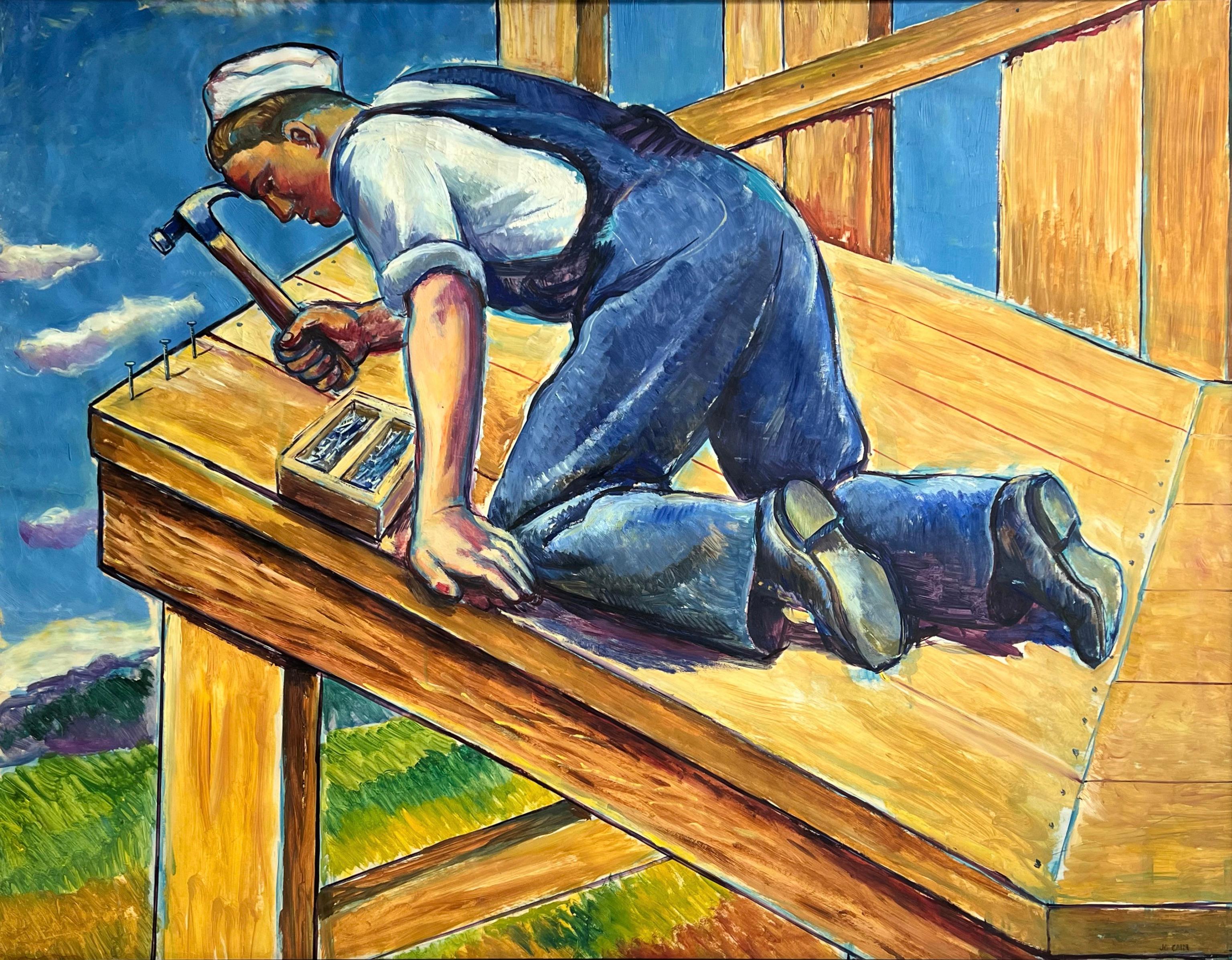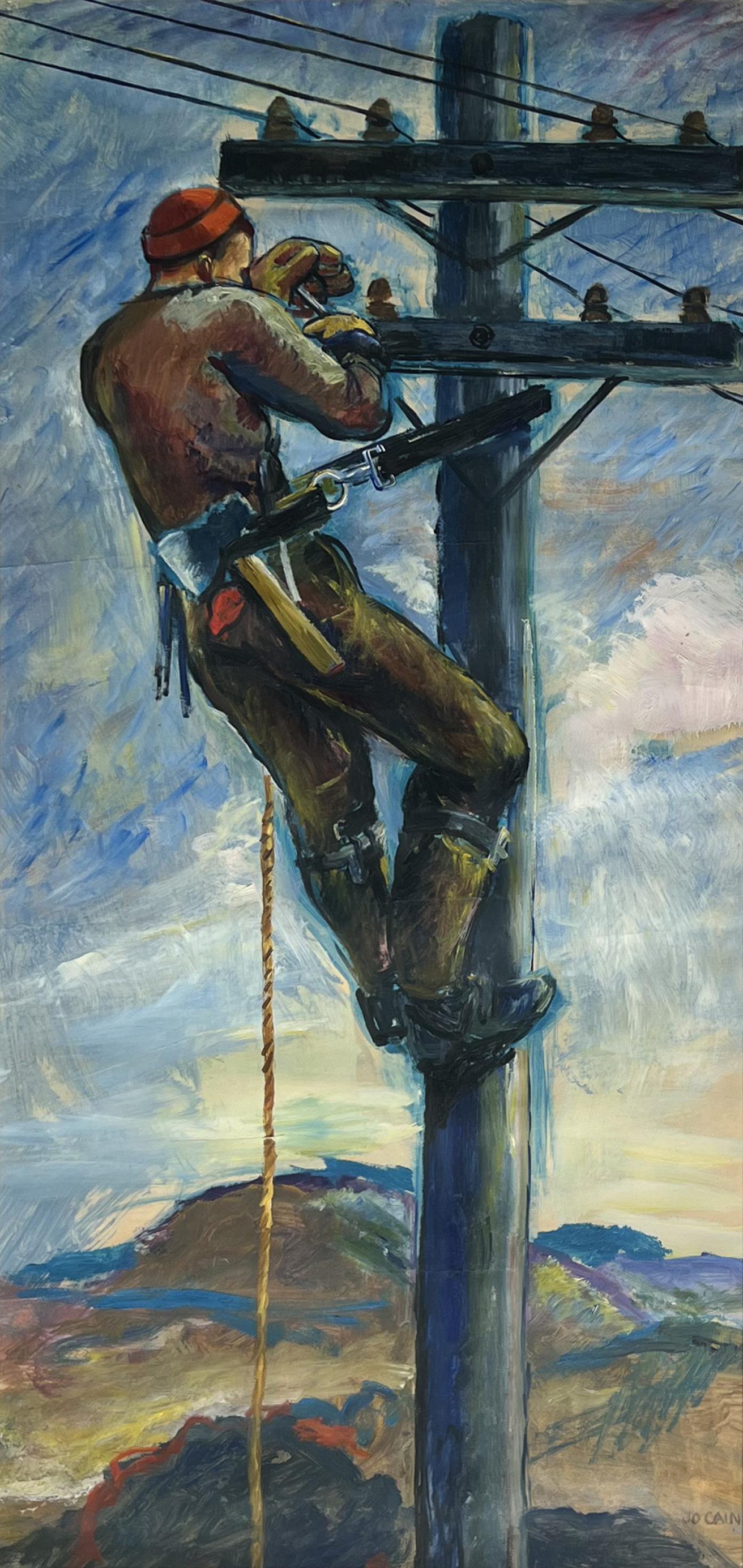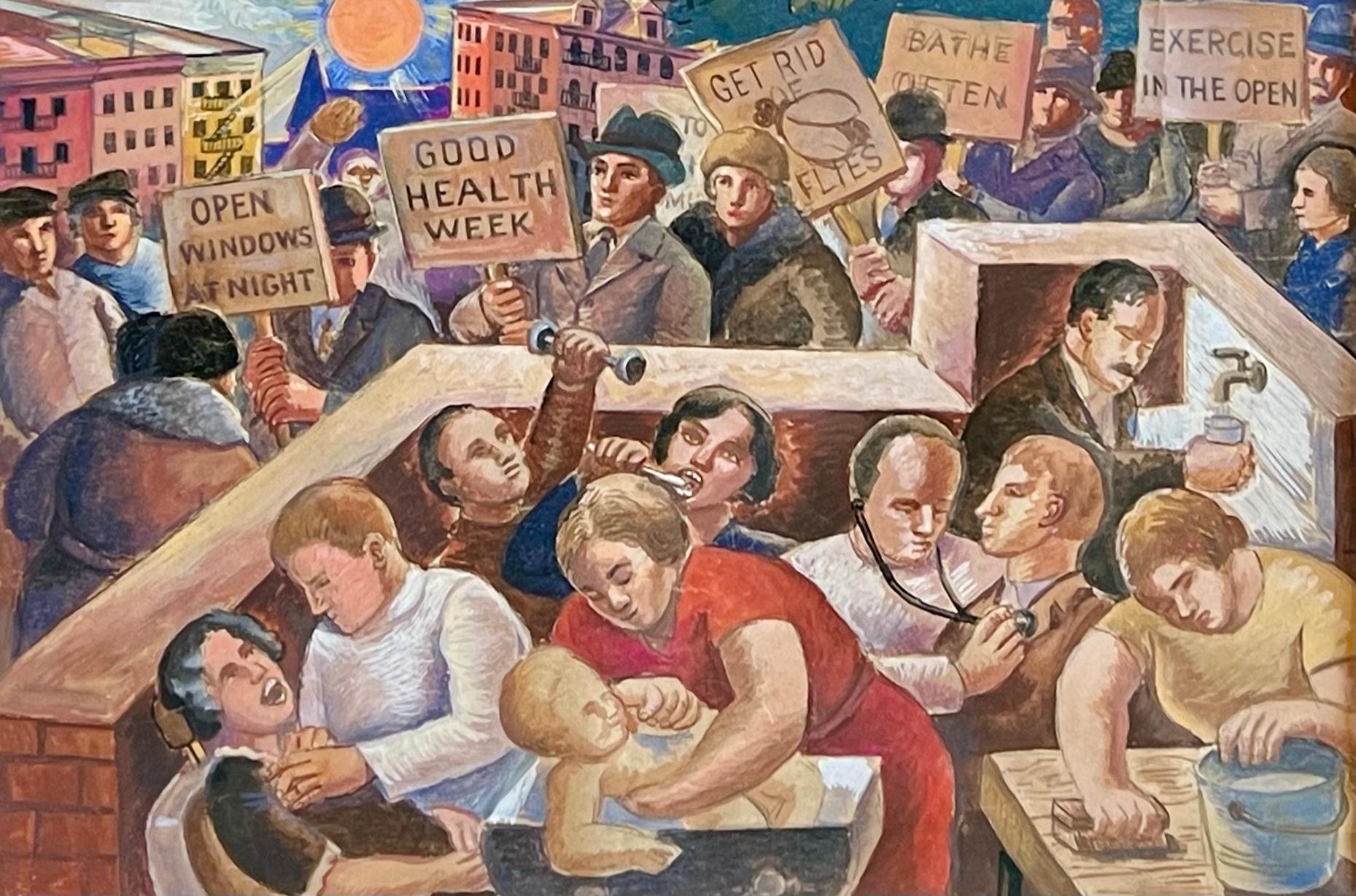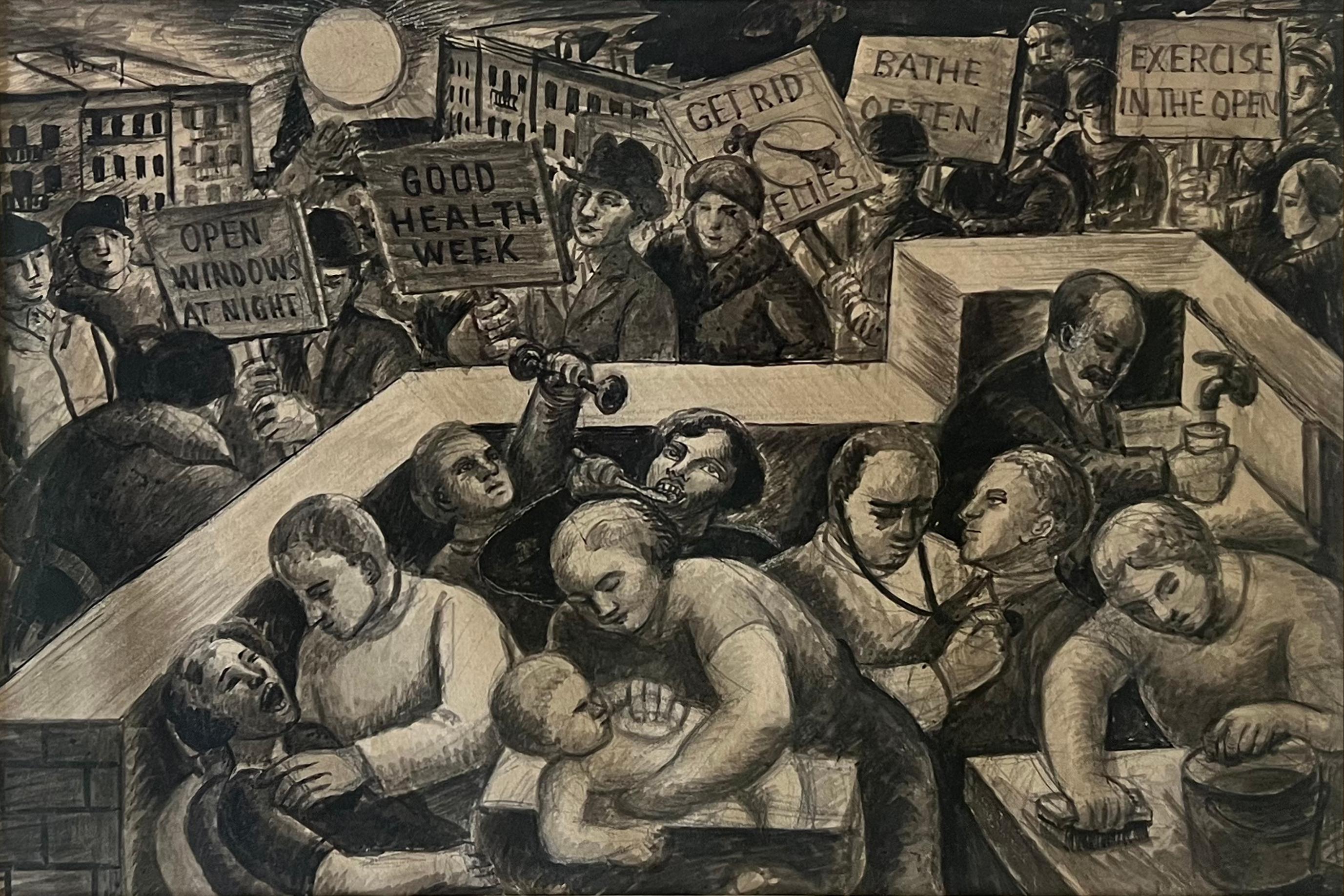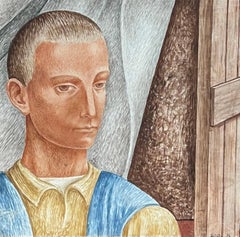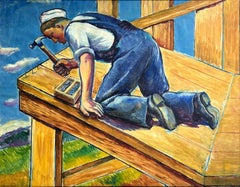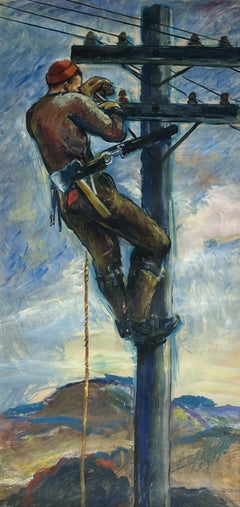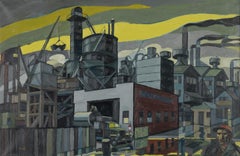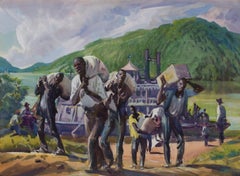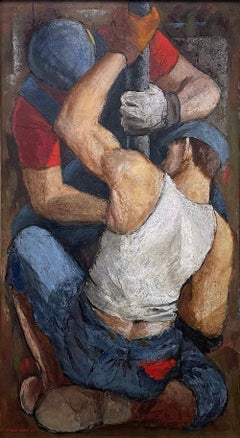Items Similar to St, Louis River Mural Study American Scene Social Realism Mid 20th Century WPA
Want more images or videos?
Request additional images or videos from the seller
1 of 7
Jo CainSt, Louis River Mural Study American Scene Social Realism Mid 20th Century WPAc. 1930s
c. 1930s
$15,000
£11,352.68
€13,035.14
CA$21,368.75
A$23,174.91
CHF 12,172.34
MX$281,500.11
NOK 152,317.62
SEK 143,415.54
DKK 97,316.34
About the Item
St, Louis River Mural Study American Scene Social Realism Mid 20th Century WPA
Jo Cain (1904-2003)
The Drama of the St. Louis Great River
23 1/4 x 25 ½ inches
Gouache on board c. 1930s
Estate stamp verso
34 x 36 inches framed
Our gallery is pleased to present the exhibition, "Jo Cain: Echoes of an Era," a tribute to the enduring legacy of Joseph Lambert Cain and a celebration of his art that transcends time and remains relevant today. The exhibition features mural studies, works on paper and paintings from the 1930s and 40s, all are available on 1stDibs.
BIO
JOSEPH LAMBERT CAIN (1904–2003)
A painter, muralist, and art educator, Joseph Cain's work was consistently infused by the color and vibrancy of his native New Orleans, even as he pursued a career that took him far from home. Beginning at the age of sixteen, his educational journey led him first to the Art Institute of Chicago and then to the Art Students League in New York, where he was instructed by Kenneth Hayes Miller, Kimon Nicolaides and Vaclav Vytlacil. He later studied under the Abstract Expressionist Hans Hoffman. A 1929 Carnegie Fellowship funded a year's enrollment at the Sorbonne in Paris and travel throughout Europe; Cain also received multiple Tiffany Foundation Fellowships.
Using thickly applied paint, layered color planes, and multiple perspectives, Cain created paintings, including streetscapes, marine scenes, and landscapes, which were sometimes categorized as "decorative expressionism" beginning in the late 1930s.
In 1932, Cain's entry to the First Biennial Exhibition of Contemporary American Painting at the Whitney Museum of American Art hung in the exhibition's entry way; other works were shown at such prestigious venues as the Museum of Modern Art, American Art, Pennsylvania Academy of the Fine Arts, National Academy of Design, and Carnegie Institute.
He also executed a monumental mural at New York State Training School where he was employed as a teacher. While living in New York during this period, Cain was an integral member of a contemporary art collective known as "The Group," whose participants included Milton Avery, George Biddle, Robert Gwathmey, Marsden Hartley, John Marin, and many other important modernists.
Jo’s work evolved continuously. Moving from realism in the ‘20’s, he developed a highly personal, cubism based, abstract style similar in spirit to that of Stuart Davis and clearly influenced by Leger, Matisse and Picasso. In 1944, Cain joined the faculty at the University of Rhode Island, establishing and chairing the art department for over two decades. He continued creating art until his death.
- Creator:Jo Cain (1904)
- Creation Year:c. 1930s
- Dimensions:Height: 34 in (86.36 cm)Width: 36 in (91.44 cm)Depth: 2 in (5.08 cm)
- Medium:
- Movement & Style:
- Period:
- Condition:
- Gallery Location:New York, NY
- Reference Number:1stDibs: LU1156213251572
About the Seller
5.0
Gold Seller
Premium sellers maintaining a 4.3+ rating and 24-hour response times
Established in 2008
1stDibs seller since 2019
195 sales on 1stDibs
Typical response time: <1 hour
- ShippingRetrieving quote...Shipping from: Pawling, NY
- Return Policy
Authenticity Guarantee
In the unlikely event there’s an issue with an item’s authenticity, contact us within 1 year for a full refund. DetailsMoney-Back Guarantee
If your item is not as described, is damaged in transit, or does not arrive, contact us within 7 days for a full refund. Details24-Hour Cancellation
You have a 24-hour grace period in which to reconsider your purchase, with no questions asked.Vetted Professional Sellers
Our world-class sellers must adhere to strict standards for service and quality, maintaining the integrity of our listings.Price-Match Guarantee
If you find that a seller listed the same item for a lower price elsewhere, we’ll match it.Trusted Global Delivery
Our best-in-class carrier network provides specialized shipping options worldwide, including custom delivery.More From This Seller
View AllWPA Mural Study 1940 American Scene Modern Social Realism Figurative Mid Century
By Michael Loew
Located in New York, NY
WPA Mural Study 1940 American Scene Modern Social Realism Figurative Mid Century
Michael Loew (1907-1985)
Detail for Mural (Social Security Building Washington D.C.)
24 x 24 inches ...
Category
1940s American Realist Figurative Paintings
Materials
Canvas, Oil
Industrial Man Working Mid 20th Century American Scene Social Realism Modern WPA
By Jo Cain
Located in New York, NY
Industrial Man Working Mid 20th Century American Scene Social Realism Modern WPA
Jo Cain (1904 - 2003)
Hammering Nails
39 x 50 ½ inches
Gouache on paper c. 19...
Category
1930s American Realist Figurative Drawings and Watercolors
Materials
Paper, Gouache
Man Working Mid 20th Century American Scene Social Realism Industrial WPA Modern
By Jo Cain
Located in New York, NY
Man Working Mid 20th Century American Scene Social Realism Industrial WPA Modern
Jo Cain (1904 - 2003)
Telephone Pole Worker
38 1/4 x 18 1/2 inches
Oil on pap...
Category
1930s American Realist Figurative Drawings and Watercolors
Materials
Paper, Gouache
WPA Post Office Mural Study American Scene Regionalism Social Realism Modern Art
By Louise Ronnebeck
Located in New York, NY
WPA Post Office Mural Study American Scene Regionalism Social Realism Modern Art
Louise Emerson Ronnebeck (1901 - 1980)
Oil Riggers, Mural Study
Image: 6 1/2 x 37 inches
Watercolor ...
Category
1930s American Modern Figurative Drawings and Watercolors
Materials
Watercolor, Cardboard, Paper
"Good Health Week" WPA American Scene Mid 20th Century Modern Social Realism
By Jo Cain
Located in New York, NY
"Good Health Week" WPA American Scene Mid 20th Century Modern Social Realism
Jo Cain (1904 – 2003)
Good Health Week
10 ½ x 15 1/2 inches
Oil on pape...
Category
1940s American Realist Figurative Drawings and Watercolors
Materials
Paper, Oil
"Good Health Week" American Scene Modern Social Realism Mid 20th Century WPA Era
By Jo Cain
Located in New York, NY
"Good Health Week" American Scene Modern Social Realism Mid- 20th Century WPA Era
Jo Cain (1904 – 2003)
Good Health Week – b/w
10 ½ x 15 1/2 inches
I...
Category
1930s American Realist Figurative Drawings and Watercolors
Materials
Paper, Ink
You May Also Like
"Colonial Sand and Stone Company, New York, " Industrial WPA Scene, Precisionist
By William Sharp
Located in New York, NY
William Sharp (1900 - 1961)
Factory on the River
Oil on canvas
20 1/2 x 28 1/2 inches
Initialed lower left: WS
Provenance:
Estate of the artist
Private Collection, New York
Swann Auction Galleries, American Art, June 13, 2019, Lot 178
Private Collection, New York
Colonial Sand and Stone Co., founded by Generoso Pope, was once the country’s largest sand and gravel business, providing the concrete for much of New York City’s skyline, including the Empire State Building, Rockefeller Center, Radio City Music Hall, airports and subways.
William Sharp was born on June 13, 1900, in Lemberg, Austria, where he attended college and the Academy for Arts and Industry. He later studied in Kraków, Poland, and in Berlin and Munich, Germany. Sharp began his career as a designer of stained-glass windows and as a painter of murals. He served in the German army during World War I. After the war he became a newspaper artist in Berlin and a well-known etcher.
Sharp drew political cartoons that were bitterly critical of the growing Nazi movement. As the influence of National Socialism intensified, he began to contribute drawings, under a pseudonym, to publications that were hostile to Hitler. After Hitler assumed power, Sharp was confronted with these drawings and told that he would be sent to a concentration camp. However, in 1934, he escaped to the United States.
His first newspaper assignment in America was making courtroom sketches for The New York Mirror...
Category
Mid-20th Century American Realist Landscape Paintings
Materials
Canvas, Paint, Oil
Stevedores, Ohio River, Early 20th Century Cleveland School Artist
By Frank Wilcox
Located in Beachwood, OH
Frank Nelson Wilcox (American, 1887-1964)
Stevedores, Ohio River, c. 1920
Watercolor on paper
Signed lower right
21.5 x 29. 5 inches
"The trip Otto Ege and I made from Pittsburgh to Marietta by riverboat and then by train to Mammoth Cave, was the next high spot in my artistic explorations. We saw something of the Old Southern river life on the way - the roustabouts, the showboat and river town life at Point Pleasant, and then to the sombre tonal mysteries of the Cave. These sights added much to my pictorial vocabulary..." - Frank Wilcox
Frank Nelson Wilcox (October 3, 1887 – April 17, 1964) was a modernist American artist and a master of watercolor. Wilcox is described as the "Dean of Cleveland School...
Category
1920s American Modern Landscape Drawings and Watercolors
Materials
Watercolor
"Pipe Fitters", 1951 Paean to the Working Man by Gere, Wisconsin Painter
Located in Philadelphia, PA
Although this painting dates to 1951, a few years after the Works Progress Administration (WPA) period ended in the 1940s, this tight composition of two pipe fitters doing their work in a cramped space is very much akin to America's Depression-era murals that celebrated the American worker. The painter was Byron Gere...
Category
Vintage 1950s American Art Deco Paintings
Materials
Paint
"Working Laborers, " Francis Bevilacqua, Soviet Cold War Art
Located in New York, NY
Francis Bevilacqua (American, b. 1911)
Working Laborers, n.d.
Oil and pigment on black granite
44 x 21 inches
Signed lower right
Born in 1911, Francis Bevilacqua was predominantly influenced by the 1930s. The period of the 1930s is epitomized by the conflict between many political ideologies, including Marxist Socialism, Capitalist Democracy, and the Totalitarianism of both Communism and Fascism. In the Soviet Union, Stalin’s government needed urgent funds to implement the rapid industrialization demanded by the first Five Year Plan. It initiated a secret strategy to sell off treasures from the State Hermitage Museum in Leningrad (St. Petersburg), including a primary list of two hundred and fifty irreplaceable paintings by the Old Masters, a number of which ended up in the collection of Andrew Mellon...
Category
Mid-20th Century Realist Figurative Paintings
Materials
Granite
Samuel Greenburg, Rural Scene Mural Study
Located in New York, NY
This Rural Scene Mural Study by Samuel Greenburg is scored in a manner indicating transfer to a larger format. However as yet no related image or mural is...
Category
Mid-20th Century Other Art Style Figurative Drawings and Watercolors
Materials
Tempera, Pencil
Factory Worker
Located in Los Angeles, CA
This painting is part of our exhibition America Coast to Coast: Artists of the 1930s
Factory Worker, c. 1936, oil on canvas, signed lower right, 18 ¼ x 36 inches; exhibited in City ...
Category
1930s American Realist Figurative Paintings
Materials
Oil
More Ways To Browse
Mid Century Murals
John Stuart Mid Century Chair
Wpa Paintings Social Realism
St Louis Painting
Kimon Nicolaides
Wpa Mural Study
Mother Daughter Art
Oil Painting Children Playing
Oil Painting Mask
Oluwole Omofemi
Sean Brown
Social Commentary Paintings
Vintage Beach Woman
Vogue Painting
Blue Tit
Drowning Art
El Mac
Female Surrealists Art
